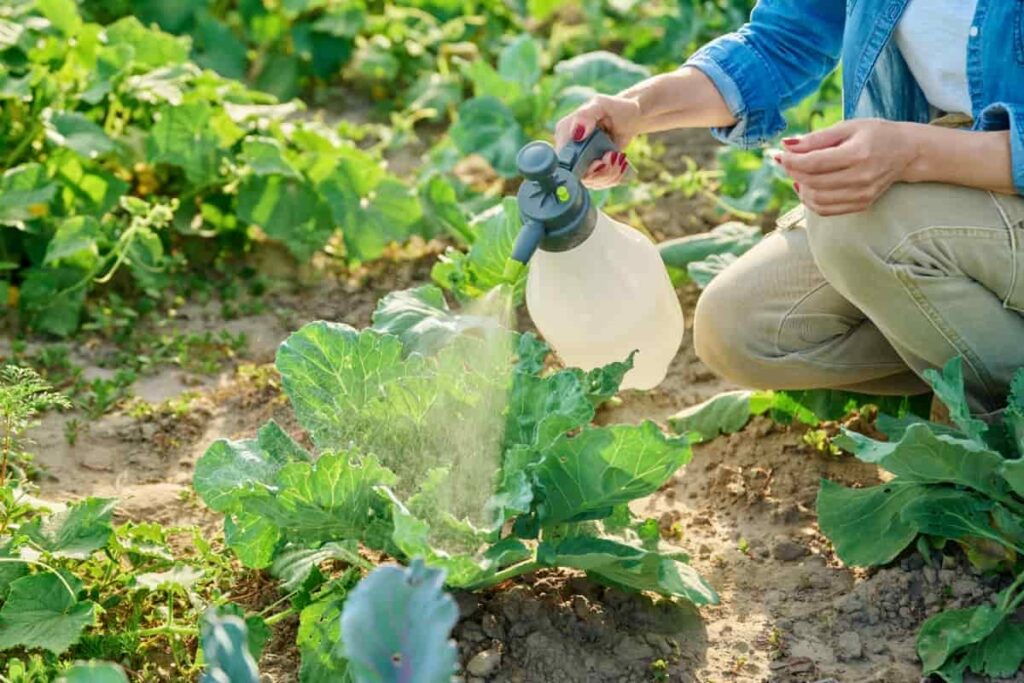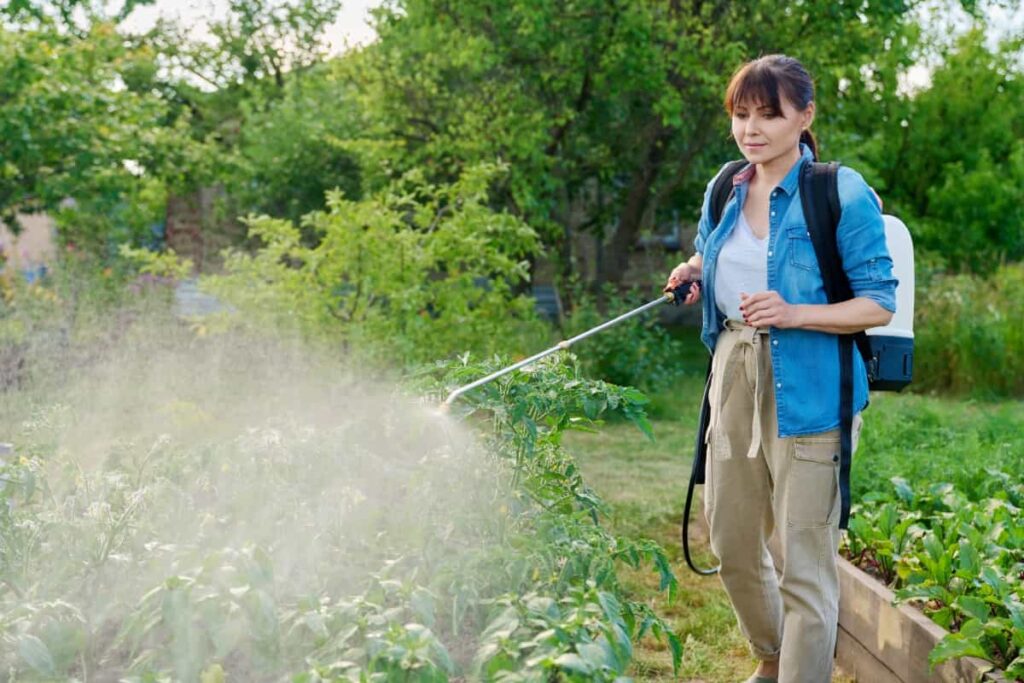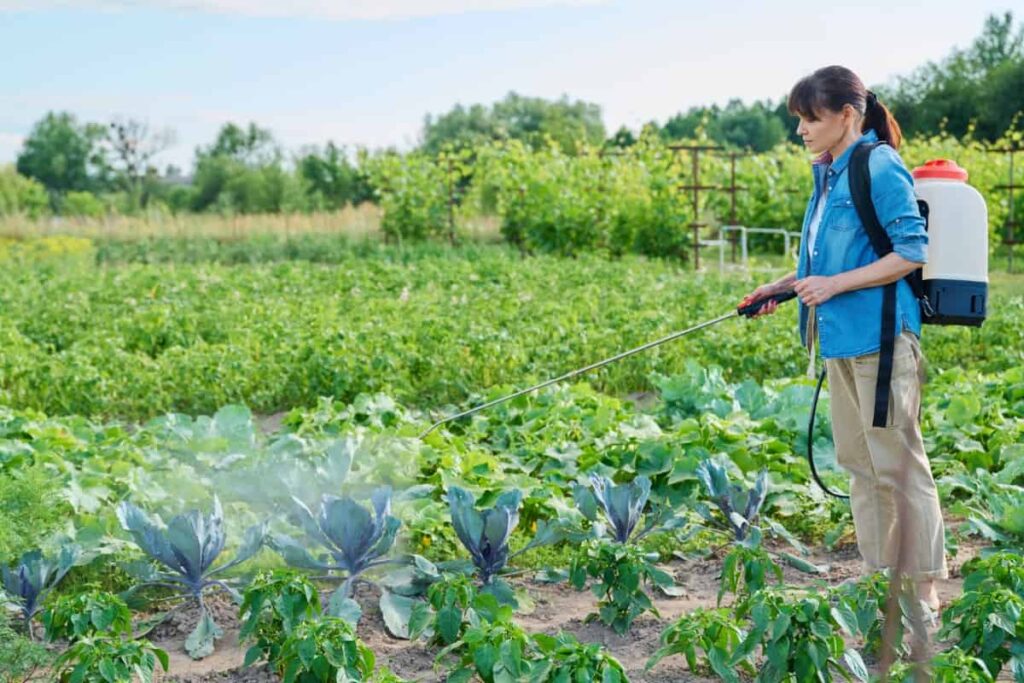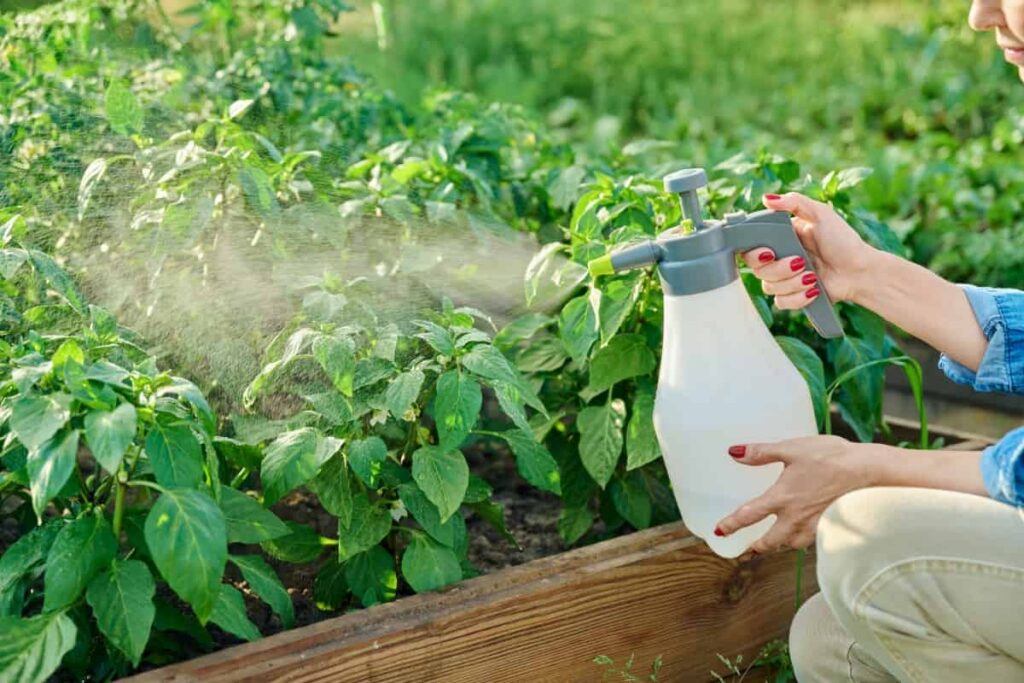Many gardeners prefer to use natural pesticides rather than synthetic chemicals to protect vegetable plants from pests. Natural pesticides are less harmful to the environment, safer for humans and animals, and can still be highly effective at controlling pests.

In this article, we’ll explore the 10 best natural pesticides for vegetable plants that are 100% effective at killing bugs on vegetable plants. These natural pesticides are derived from plant-based ingredients and are easy to make or purchase. They offer an eco-friendly and safe alternative to chemical pesticides.
10 Best Natural Pesticides for Vegetable Garden
Neem Oil: The All-Purpose Organic Pesticide
Neem oil is extracted from the neem tree’s seeds and has been used for centuries in traditional agriculture due to its insecticidal properties. It contains compounds such as azadirachtin, which disrupts the life cycle of insects by inhibiting feeding, growth, and reproduction. It is one of the natural insecticides for vegetables.
Application Rates and Timing for Vegetables
For this organic vegetable garden pest control, neem oil should be applied as a spray to vegetables at a concentration of 0.5-2% solution, based on the severity of the pest infestation. It is best applied in the early morning or late afternoon to avoid leaf burn, and it should be reapplied every 7-14 days or after rainfall.
Diatomaceous Earth: Mechanical Pest Control
Diatomaceous earth is an eco-friendly vegetable gardening solution naturally occurring sedimentary rock composed of fossilized diatoms, a type of hard-shelled algae. It is abrasive to insects with exoskeletons, causing them to dehydrate and die.
How to Effectively Apply in the Vegetable Garden
Diatomaceous earth can be applied as dust or mixed with water to create a spray. Dusting the leaves and soil around plants creates a barrier that pests must crawl through while spraying can target pests directly. Reapplication may be necessary after rain or irrigation.
Soap Spray: Gentle on Plants, Tough on Pests
Soap spray, a homemade pesticides for garden vegetables, is made by mixing liquid soap with water and is effective against soft-bodied insects such as aphids, spider mites, and whiteflies. The soap disrupts the insects’ cell membranes, causing them to dehydrate and die.
Homemade Recipes for Safe Use
To make a soap spray, mix 1-2 tablespoons of liquid soap (like castile soap or dish soap) with 1 quart of water. Spray the solution onto affected plants, making sure to cover both the tops and bottoms of leaves. Avoid spraying during the hottest part of the day to prevent leaf damage.
Garlic Spray: Natural Insect Repellent
Garlic spray acts as non-toxic pest management for veggies and can deter a wide range of pests, including aphids, caterpillars, and beetles. Garlic contains sulfur compounds that insects find repulsive.
Preparing and Applying Garlic Solution
To make garlic spray, blend 3-4 cloves of garlic with 2 cups of water and strain the mixture to remove solids. Add one tablespoon of liquid soap to help the solution adhere to plants. Spray the mixture onto affected plants, being careful to avoid spraying beneficial insects. Reapply every 1-2 weeks or after rainfall.
Chili Pepper Spray: Hot Solution for Pest Problems
Chili pepper spray harnesses the natural heat of peppers, acts as a DIY natural pest repellents for gardens, and deters insects. Capsaicin, responsible for the spicy heat of peppers, is irritating to insects but harmless to plants.
Crafting and Spraying Guidelines
To make this safe pesticide alternative for vegetable gardens, blend 2-3 hot peppers with 1 quart of water and strain the mixture. Add some dish soap liquid to help the solution adhere to plants. Spray the mixture onto affected plants, focusing on areas where pests are present. Wear hand gloves, and touching your face while handling hot peppers should be avoided.
In case you missed it: 10 Best Natural Pesticides for Hibiscus Plants: 100% Effective to Kill Hibiscus Bugs

Beneficial Insects: Nature’s Pest Controllers
Beneficial insects, green pest solutions for organic gardening, such as ladybugs, lacewings, and parasitic wasps can help control pest populations in the garden by feeding on aphids, caterpillars, and other harmful insects.
Introducing Predators to the Garden
For chemical-free garden pest prevention, you can attract beneficial insects to the garden by planting a diverse range of flowering plants, providing shelters such as rock piles, and avoiding the use of broad-spectrum pesticides that harm both pests and beneficial.
Bacillus thuringiensis (Bt): Targeted Caterpillar Control
Bt is a naturally occurring soil bacterium, an organic pest deterrent for vegetable plots, that produces proteins toxic to certain groups of insects, particularly caterpillars, and larvae of moths and butterflies.
Proper Usage for Vegetable Protection
Bt products are available in various formulations, including sprays and powders, and should be applied directly to plants where caterpillars are active. Follow label instructions carefully, as Bt is most effective when ingested by pests and must be reapplied after rain or irrigation.
Vinegar Solution: Acidic Remedy for Pathogens
Vinegar is a natural, acidic solution that can help control fungal pathogens such as powdery mildew and bacterial diseases like fire blight. It disrupts the pH balance of pathogens’ cell membranes, inhibiting their growth.
Dilution Instructions for Safe Application
To make this vinegar solution, mix equal parts vinegar (5% acidity) and water. Spray the solution onto affected plants, focusing on areas where symptoms are present. Avoid spraying vinegar on sensitive or young plants, as it can cause leaf burn.
In case you missed it: Hydroponic Homemade Organic Pesticides: DIY Preparation Recipe

Companion Planting: Strategic Plant Alliances
As organic soil treatments for pest control, companion planting involves growing certain plants together to enhance growth, repel pests, and improve overall garden health. For example, for vegetable garden companion planting for pest reduction, planting marigolds alongside vegetables can deter nematodes and repel aphids, while planting basil near tomatoes can improve flavor and repel tomato hornworms.
Beneficial Combinations for Pest Deterrence
Some beneficial plant combinations include planting mint to repel ants, planting dill to attract beneficial insects that prey on aphids, and planting nasturtiums to deter cucumber beetles.
Crop Rotation: Preventing Pest Colonization
Changing the location of crops within the garden each season to disrupt pest’s life cycles and reduce soil-borne diseases. By rotating crops, you can prevent pest infestation and natural fungal treatments for vegetable gardens.
Planning Tips for Pest Management
When planning crop rotations, group plants with similar nutrient needs together and avoid planting the same crop or its relatives in the same location year after year. Consider incorporating cover crops such as clover or buckwheat to improve soil health and suppress weeds.
In case you missed it: How to Get Rid of Ants in Potted Plants: 10 Effective Ways to Control with Natural and Homemade DIY Pesticides

Conclusion
These natural pesticides work by targeting pests while minimizing harm to beneficial insects, wildlife, and the surrounding ecosystem. They are safe for use on vegetable plants and can help protect your plants from a variety of common pests, including aphids, caterpillars, mites, and beetles. By incorporating these natural pesticides into your pest management strategy, you can enjoy healthy, pest-free vegetable plants while reducing your environmental impact.
- Profitable Village Farming Business Ideas in 2024
- High-Yield Aquaculture: Fast-Growing Fish for Farming
- Effective Fish Pond Construction Techniques for Beginners
- Irrigation and Water Management in Pineapple Farming
- Blossom to Harvest: Mastering Flowering and Pollination in Papaya Farming
- Pig Fattening Essentials: From Selection to Sale for Beginners
- Raising Wagyu Cattle: A Complete Guide for Premium Beef Production
- Soil Types and Their Water Holding Capacity
- Optimizing Irrigation Schedules for Coconut Groves for Enhanced Yield
